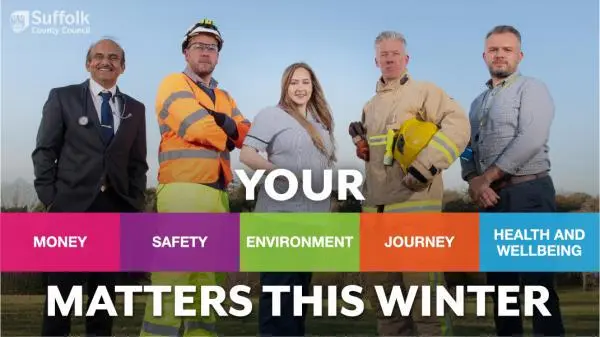Winter Vaccinations
Whilst flu and Covid are unpleasant for most people, they can be dangerous and even life-threatening for those with certain health conditions. Vaccinations are our best defence against severe illness this winter. Get vaccinated against Covid-19 and seasonal flu.
Flu Vaccine
The flu vaccine is available for free to those who are 65 and over (including those who will be 65 by 31 March 2025), frontline health and social care workers, carers, people who are in a clinical risk group, pregnant women and those who have or live with someone with a weakened immune system.
Children can also get a nasal spray flu vaccine free on the NHS if they are:
- aged 2 or 3 years on 31 August 2024 (born between 1 September 2020 and 31 August 2022)
- school children (Reception to Year 11)
- aged 2 to 17 years with long-term health conditions
If your child is aged between 6 months and 2 years and has a long-term health condition that makes them at higher risk from flu, they'll be offered a flu vaccine injection instead of the nasal spray.
This is because the nasal spray is not licensed for children under 2 years old.
To book your flu vaccine, contact Contact your GP, pharmacist or midwife.
Find out more at nhs.uk
Covid-19 Autumn Booster
The following groups of people are now eligible to receive an autumn Covid-19 booster vaccination:
- All adults aged 65 years and over
- Residents and staff in care homes
- People aged 6 months to 64 years in a clinical risk group
- Frontline health and social care workers (including volunteers)
- Contacts of people who are immunosuppressed
- People aged 16 to 64 years who are carers
Visit www.sneevaccine.org.uk to book your appointment for a Covid booster or find a walk-in clinic.
What to do if you test positive for COVID-19
If you have a positive COVID-19 test result you should try to stay at home and avoid contact with other people for 5 days after the day you took your positive test, even if you have no symptoms.
You should avoid meeting people at higher risk of becoming seriously ill with COVID-19 for 10 days after the day you took your test. See the full guidance on what to do if you test positive for COVID-19.
Some more tips to stay protected this winter:
- Winter viruses spread easily. If you have symptoms of a cough or a cold, consider staying at home to protect others. If you are unable to stay at home, consider wearing a face covering when you are close to other people.
- check weather forecasts and take this into account when planning your day
- check you have shoes with good grip, to prevent falls in cold weather
- wear several layers of clothes to stay warm
- remain active in your home and limit going outside unless it is necessary
- good hand hygiene can help prevent the spread of viruses such as norovirus or Covid-19
- check NHS: Five ways to stay healthy this winter for health guidance
Keeping warm this winter
Tips for staying warm in your home:
- Set your thermostat at around 18-21C and heat all the rooms you use in the day
- If you cannot heat all your rooms, make sure you keep your main living room warm throughout the day and heat your bedroom before going to bed
- In very cold weather, rather than turn the thermostat up, set the heating to come on earlier so you will not be cold while you wait for your home to heat up
- Have regular meals, including plenty of hot food and drinks, keeping your diet as varied as possible
- During the night try to keep the temperature above 18C in your bedroom
- Find more information from NHS: Keep warm keep well.
Warm Homes Suffolk helps vulnerable people and families make their homes warmer and cheaper to heat. The service can help in several ways:
- Help with your fuel payments
- Lend you electric heaters
- Assess you for financial assistance towards the cost of repairs or replacements if your boiler or heater stops working
- Discuss energy efficiency improvements that could make a real difference to your heating bills
- Help you to access grants to help pay for insulation and basic draught proofing
For advice on keeping warm and well this winter, call the Age UK's Winter Warmth Advice Line free on 0800 678 1602, Monday to Friday 8am to 8pm, or textphone 0800 085 7857.
For more general information, see Age UK's Spread the Warmth campaign.
Tips for looking after your health and wellbeing:
Icy roads and snow can often mean that older or more vulnerable people are not able to get out and about.
Checking the welfare of vulnerable people
If you have an elderly, vulnerable neighbour or a relative, please look out for them in the winter months. They may need help with shopping, clearing paths, walking a dog or to see a friendly face.
Check to see if the curtains are not opened during the day, or there are no lights on in the evening, as there may be something wrong.
Try knocking on the door to see if there's an answer. If not, contact a relative or friend who you think may have a key.
Are you concerned about your welfare, or the welfare of someone else?
If you have concerns about somebody who you have not seen for a while and you have not been able to contact them, get in touch with your local police force on 101.
If you have immediate concerns around your own health or welfare, or somebody else's, please call 999.
If you feel that yourself, or somebody you know, is struggling to maintain their personal care, then there may be support from adult care services.
Clearing snow and ice from pavements
Anyone can clear snow and ice from the pavement outside their home or public spaces to prevent slips and falls.
Do not be put off clearing paths because you're afraid someone will get injured. Remember, people walking on snow and ice have a responsibility to be careful themselves.
The government gives advice about clearing snow from a road, path or cycleway.


